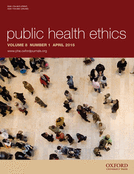-
Views
-
Cite
Cite
Bruce Jennings, Relational Liberty Revisited: Membership, Solidarity and a Public Health Ethics of Place, Public Health Ethics, Volume 8, Issue 1, April 2015, Pages 7–17, https://doi.org/10.1093/phe/phu045
Close - Share Icon Share
Abstract
Public health involves the use of power to change institutions and redistribute resources and deliberately to shape individual thought and behavior. This requires normative legitimation and demands ethical critique. This article explores concepts that are vital to public health ethics, but have been relatively neglected. These are membership, solidarity and the concept of place. The article argues that the practice of public health should recognize the equal rights of membership in communities of health justice. Public health should also rely on a sense of obligation and mutual aid in a world of shared vulnerability and reciprocal recognition. Finally, public health achieves its goals not merely—and perhaps not most fundamentally—through information and altering the logical ratiocination of individuals or groups, but rather through the reformation of sense and sensibility.



